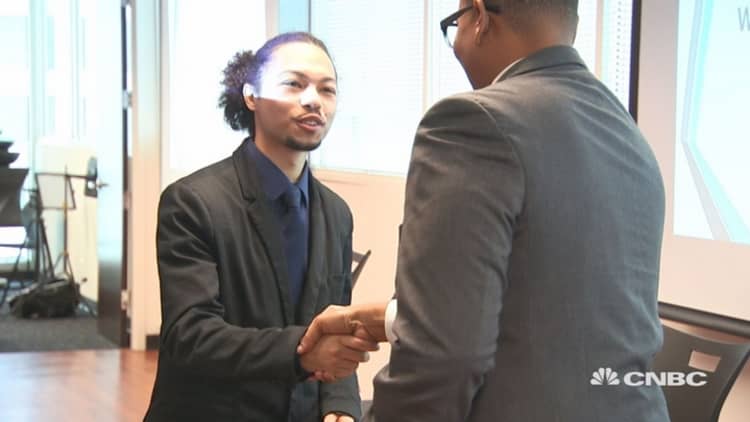JPMorgan Chase is making a big bet — on younger Americans who don't have jobs.
Last month, the Wall Street mega-bank committed $75 million to tackle youth unemployment, which in parts of Europe, the Middle East and Africa is well above 20 percent, and is frequently mentioned as being responsible for a range of social ills in those regions. In the U.S., the youth unemployment rate runs at 10 percent, about double the national jobless rate and totaling more than 5 million.
For the U.S. economy, the stakes are high: A 2014 paper by the Brookings Institution estimated that unemployment among the 16-24 age group will account for $20 billion in lost earnings over the coming decade.
Longer term, the collective social burden of youth unemployment will cost the economy a mind-boggling $4.75 trillion, estimates from the Corporation for National and Community Service say. Put in context, that is nearly one-third of the nominal value of the U.S. economy as a whole.
Enter JPMorgan, which is plowing millions into its New Skills for Youth Initiative, an effort that will invest in a range of job education programs and skill training.
Yet looming in the background are scores of programs and pledges that have sought to bolster the fortunes of the young. In an interview with CNBC, one of the organizations working with JPMorgan to administer the funds explained how the initiative plans to make meaningful changes, and seeks to avoid the fate of other pledges that have been made in the past.
"This is a significant investment that will help states turn their bold visions into a reality," said Stephen Bowen, the director for innovation at the Council of Chief State School Officers and the National Association of State Directors of Career Technical Education Consortium. "It is a crisis that only 60 percent of students in high-poverty urban school districts graduate from high school and that more than five million young people are out of work and school."
Recently, the nonprofit education organization also received a $15.4 million pledge from the Bill and Melinda Gates Foundation, and is at the center of education reform efforts. CCSSO runs a career readiness program that seeks to address the "skills gap" of unemployed youth, and helps prepare them for high school graduation and beyond.
"Without the right skills or education, they find themselves stuck in low-skill, low-wage jobs or unemployed," he added. "We are investing in high-quality, career-focused education programs so that more young people have a shot at real economic opportunity."
This fall, CCSSO will use part of JPMorgan's funding to award about 10 states with grants of $1.5 million to $2 million each to develop "career-focused education" for unemployed youth, and will track the effectiveness of each program.
"States must ensure students graduate from high school with the opportunities and the options to take on high-skill, high-demand careers," Bowen said. "To do that, we must improve career preparation in our K-12 public education systems, and work with our partners in communities, in higher education, and in the business community to be sustainable."
Avoiding the Zuckerberg curse?

So can JPMorgan's money be put to better use than Mark Zuckerberg's?
Amid much fanfare in 2010, the Facebook founder famously donated $100 million to a five-year program to fix Newark's faltering public school system. Through a combination of mismanagement, overspending and what critics say were well-intentioned but poorly executed goals, the money never managed to achieve the lofty goals it set out to accomplish. Still, Zuckerberg defended the investment, adding that "it is important that we not overlook the positive results" despite its shortcomings.
With JPMorgan's commitment, Bowen explained that his organization has carefully crafted "a system that will ensure success in states," he said. "The New Skills for Youth grant opportunity has clear goals and measures of success, and solid guidelines that all states will follow in writing their applications and crafting state-specific plans once awarded."
Bowen stated that by aligning education and training programs with the skills that businesses need — that experts say are crucial to whittling down the youth jobless rate — the initiative stands a better shot at success.
"With this level of support, states can move forward with a bold plan on what school should look like in the future to ensure all students graduate from high school not only college ready, but career ready," Bowen added.



